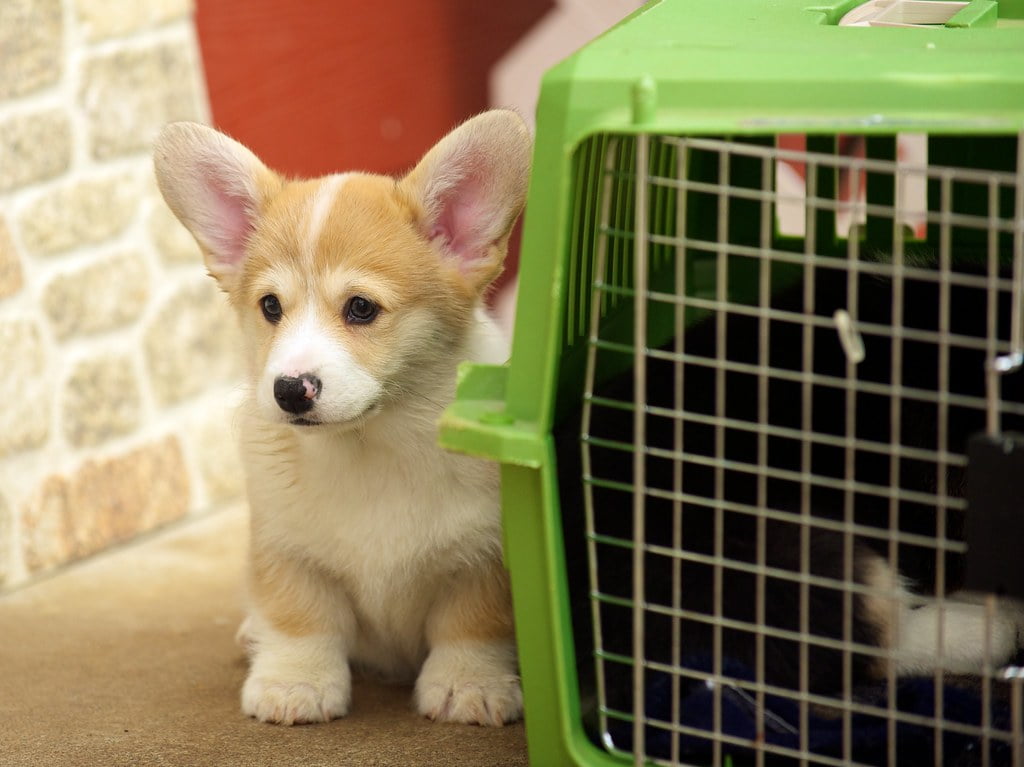Have you ever considered crate training your Corgi? It’s a great way to help keep your pup safe, secure and happy. Crate training is an effective way to teach your Corgi puppy the house rules, as well as providing them with their own private space to relax in.
Crate training is not only beneficial for your pup, but it’s also great for you too. By having a designated area for your pup to stay in when you are away or when they need some time out, it can help alleviate stress and make life much easier. Plus, crate trained dogs are more content and relaxed which makes them easier to manage.
In this article we will explore everything you need to know about Corgi crate training. We will cover topics such as why crate training is important in Corgi Training, how to start the process, and tips for successful crate training. Read on and discover the best way to make sure that your Corgi is safe, secure and happy!
Table of Contents
How Long Does It Take To Crate Train A Corgi?
Crate training a corgi can be a great way to help your pup learn the house rules and make potty training easier. The process can take anywhere from days to weeks, depending on the individual pup’s personality and level of comfort with the crate.
It is important to remember that crate training should always be done with positive reinforcement, as opposed to punishment or yelling.
When beginning the crate training process, it is important to ensure your pup is comfortable in their new crate. Start by introducing them to their crate in a positive manner and give them treats when they willingly enter it.
If your pup is hesitant or anxious about entering their crate, try placing a favorite toy or treat inside for them to explore and discover. This will help build trust between you and your dog as well as help them become more comfortable in their new environment.
It also helps to establish a routine to potty train your Corgi so that they can start getting into the habit of going outside when needed. In the beginning, put out pee pads as a new puppy will simply go in the crate area when they’re young.
Whenever you take your pup out for potty breaks, reward them with praise or treats when they do their business outside so they associate the behavior with something positive. When they no longer go in the crate you can replace the pee pads with a soft blanket or bed.
With patience, consistency, and positive reinforcement, your corgi will eventually become fully crate trained in no time!
What Size Crate For A Corgi?
When selecting a crate for your Pembroke Welsh corgi, it’s important to consider the size of your pup. For an adult dog, you will want to get a crate that is big enough for them to stand up and turn around in comfortably.
However, if you have a corgi puppy, they will need more room to grow into so it may be best to get one that’s slightly larger than what they need right now.
It is also important to make sure the crate you select is made of durable material and has a design that allows for adequate ventilation.
The crate should also have a secure latch system so your pup won’t be able to escape or get injured while inside their crate. Lastly, it is helpful to look for crates with removable dividers so you can adjust the size as your puppy grows and develops.
No matter which type of dog crate you decide on, it is essential that your Pembroke Welsh corgi feels comfortable in their new space. Set up their crate in a quiet area away from distractions and provide plenty of soft bedding and toys for them to enjoy while inside their crate.
With the right size and setup, your pup will quickly learn how to love spending time in their new home away from home!
Are Corgis Easy To Crate Train?

Fortunately, crate training a Pembroke Welsh corgi is relatively easy. With the right size, setup, and approach, most corgis can be successfully potty trained in a matter of weeks.
The key to successful crate training is to ensure your pup has a positive association with their new space from the start.
To do this, it’s important to make sure your pup feels comfortable and at ease when inside their crate. This means providing them with plenty of soft bedding and toys to enjoy while inside the wire crate.
Furthermore, you should make sure not to force them into their crate or punish them for going inside it on their own. Instead, offer treats and praise whenever they willingly enter their crate so they learn that it’s a safe place for them.
You can also help your pup adjust to spending time in their new space by breaking up long periods of confinement into smaller intervals.
For example, if you’re planning on leaving your pup in the crate overnight, start by leaving them in there for only an hour or two at first before gradually increasing the amount of time they spend inside it each day until they are comfortable being left alone for longer stretches of time.
With patience and consistency, your Pembroke Welsh corgi will soon learn how enjoyable crate time can be!
Can Corgis Be Left Alone All Day?
It’s important to remember that while crate training is a great way to help your corgi adjust to being alone, it should not be used as a substitute for potty breaks and longer periods of socialization. Even when left in their crate, corgis still need regular opportunities to relieve themselves and interact with their owners throughout the day.
For those who must leave their pup alone for extended periods of time, baby gates can be an effective alternative to crating. By setting up baby gates around the house, you can provide your pup with enough space to explore without having them roam freely around the home.
This will help keep them safe while also giving them plenty of opportunities to engage in natural behaviors like chewing or playing with toys. Additionally, baby gates can be used in conjunction with crate training so that your pup can have access to both secure spaces and more open areas throughout the day.
Making sure your corgi has plenty of physical and mental stimulation while alone is key for keeping them happy and healthy when you are away from home. Whether they are in their crate or exploring behind a baby gate, providing your pup with toys and treats can go a long way towards making solo time enjoyable instead of stressful.
With this balance between secure spaces and supervised freedom, you’ll be able to give your Pembroke Welsh corgi all the love they need even when you’re away from home!
Conclusion
Corgi crate training is an important part of owning a corgi. It can take some time to properly train a corgi, but the results are worth it.
Corgis are smart dogs that respond well to consistent crate training. The size of the crate should be big enough for your corgi to move around comfortably, but not so big that they feel like they have too much space.
Corgis generally do not do well when left alone all day, so if you plan on leaving your pup for extended periods of time, it’s important to make sure they are exercised beforehand and provide plenty of toys and treats for their comfort.
Although it may take some patience and dedication on your part, successfully crate training your corgi will lead to a happier and healthier pet in the long run. With positive reinforcement and consistency, your corgi will soon learn what is expected of them and be comfortable in their crate when you are away from home.


